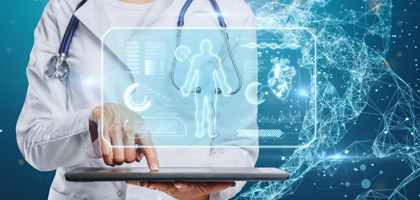
Insights
The Role of Digital Transformation in Healthcare
The Role of Digital Transformation in Healthcare
Healthcare organizations need to invest in artificial intelligence and other similar advanced technologies. The existence of these technologies requires digital transformation in healthcare.
With the pandemic process, almost every activity in our lives has turned into digital. Although there is a great longing for the days before the pandemic in healthcare businesses, a new normal order has emerged from digital health to data driven healthcare. Once this transformation takes place, organizations will need to demonstrate how this new system will improve quality, access and effectiveness in healthcare.
Quality: To ensure the effectiveness of the care provided and to improve the patient experience.
Access: Providing proactive care or facilitating access to the health care system should a need arise.
Efficiency: To improve health care processes and reduce health care costs for each individual while guaranteeing quality and access.
To achieve these goals, digital transformation will be the key point.
Transformation Steps from Digital Health to Data-Driven Healthcare

Health institutions can easily transition from digital health to data-driven healthcare by following the steps below.
Identify and Invest
Healthcare organizations need to invest in artificial intelligence and other similar advanced technologies. Clinical workflows AI and advanced analytics will automate decision making. The existence of these technologies requires a transformation from a digital health approach to a data-driven healthcare approach.
Develop Big Data Analytics
Technological devices generate vast amounts of data that can be analyzed to provide real-time clinical or medical care. In order to derive useful values from these data, the data must provide 4 factors under the heading of correct recruitment, facilitating chronic care and reducing medication error rates.
Relevance: To determine the necessary data to achieve organizational goals and to develop studies in line with the views obtained from these data.
Actionability: The data should provide sufficient future insights to create a clear roadmap for those who decide what actions to take. This requires correctly shaped, consistent, complete and open data to be used across systems.
Availability: All data required for effective analysis should be easily accessible and readable. Inaccurately described and shared restrictions may prevent the healthcare professional from accessing necessary information that can be effective in patient care.
Interoperability: Health professionals need to regularly seek data from different sources. With detailed data analysis, health systems can set very homogeneous communication standards by sharing ideas.
Follow Technology Trends

Simple technology solutions relatively reduce the costs of improving healthcare outcomes. Next-generation innovations such as AI and precision medicine envision combining big data analytics and machine learning algorithms. This will allow us to use the data more.
Data Security
Health organizations need to implement certain measures to ensure an adequate level of data protection. Compliance with regulatory rules should be evaluated and monitored during the data processing process. Data management policies should be defined and updated. Persons interested in health data should be trained. Secure information systems should be designed.
Despite all these benefits of digital transformation, healthcare leaders must be prepared for a certain level of resistance. What is key at this stage is to communicate effectively, to emphasize the seriousness of the goals and how these technologies will improve patient care.
In addition, you can get detailed information about benefits of internet of things in healthcare by reading our article titled Benefits of Internet of Things (IoT) in Healthcare See you on different topics.
Source: https://bit.ly/3vdPU1b









